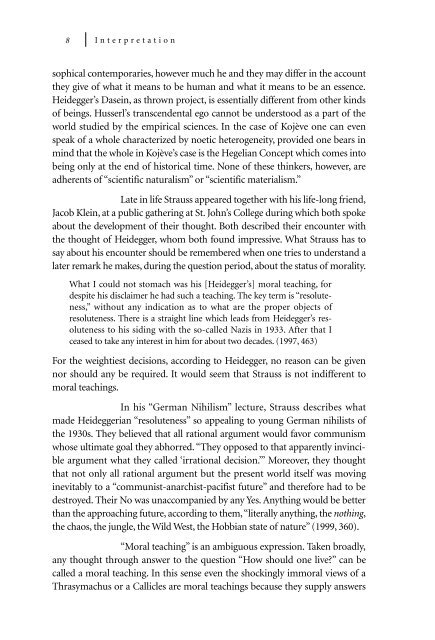Beyond Struggle and Power: Heidegger's Secret ... - Interpretation
Beyond Struggle and Power: Heidegger's Secret ... - Interpretation
Beyond Struggle and Power: Heidegger's Secret ... - Interpretation
Create successful ePaper yourself
Turn your PDF publications into a flip-book with our unique Google optimized e-Paper software.
8 <strong>Interpretation</strong><br />
sophical contemporaries, however much he <strong>and</strong> they may differ in the account<br />
they give of what it means to be human <strong>and</strong> what it means to be an essence.<br />
Heidegger’s Dasein, as thrown project, is essentially different from other kinds<br />
of beings. Husserl’s transcendental ego cannot be understood as a part of the<br />
world studied by the empirical sciences. In the case of Kojève one can even<br />
speak of a whole characterized by noetic heterogeneity, provided one bears in<br />
mind that the whole in Kojève’s case is the Hegelian Concept which comes into<br />
being only at the end of historical time. None of these thinkers, however, are<br />
adherents of “scientific naturalism” or “scientific materialism.”<br />
Late in life Strauss appeared together with his life-long friend,<br />
Jacob Klein, at a public gathering at St. John’s College during which both spoke<br />
about the development of their thought. Both described their encounter with<br />
the thought of Heidegger, whom both found impressive. What Strauss has to<br />
say about his encounter should be remembered when one tries to underst<strong>and</strong> a<br />
later remark he makes, during the question period, about the status of morality.<br />
What I could not stomach was his [Heidegger’s] moral teaching, for<br />
despite his disclaimer he had such a teaching. The key term is “resoluteness,”<br />
without any indication as to what are the proper objects of<br />
resoluteness. There is a straight line which leads from Heidegger’s resoluteness<br />
to his siding with the so-called Nazis in 1933. After that I<br />
ceased to take any interest in him for about two decades. (1997, 463)<br />
For the weightiest decisions, according to Heidegger, no reason can be given<br />
nor should any be required. It would seem that Strauss is not indifferent to<br />
moral teachings.<br />
In his “German Nihilism” lecture, Strauss describes what<br />
made Heideggerian “resoluteness” so appealing to young German nihilists of<br />
the 1930s. They believed that all rational argument would favor communism<br />
whose ultimate goal they abhorred. “They opposed to that apparently invincible<br />
argument what they called ‘irrational decision.’’’ Moreover, they thought<br />
that not only all rational argument but the present world itself was moving<br />
inevitably to a “communist-anarchist-pacifist future” <strong>and</strong> therefore had to be<br />
destroyed. Their No was unaccompanied by any Yes. Anything would be better<br />
than the approaching future, according to them,“literally anything, the nothing,<br />
the chaos, the jungle, the Wild West, the Hobbian state of nature” (1999, 360).<br />
“Moral teaching” is an ambiguous expression. Taken broadly,<br />
any thought through answer to the question “How should one live?” can be<br />
called a moral teaching. In this sense even the shockingly immoral views of a<br />
Thrasymachus or a Callicles are moral teachings because they supply answers
















